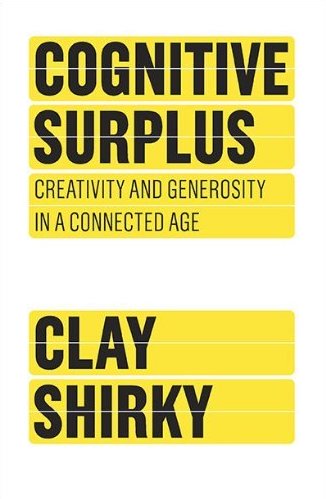I re-read Clay Shirky’s 2010 book “Cognitive Surplus” yesterday.

There’s some good ideas in there.
Here’s a summary by Claude:
“Cognitive surplus” is a concept popularized by Clay Shirky in his 2010 book “Cognitive Surplus: Creativity and Generosity in a Connected Age.” The basic idea is that modern society has a vast untapped reservoir of human intellectual capacity and free time that could be directed toward creative and socially beneficial purposes. The concept emerged from Shirky’s observation that people in developed economies collectively have billions of hours of free time that, historically, was often spent on passive consumption like watching television. With the rise of the internet and digital technologies, this surplus of human attention and cognitive capacity can be channeled into collaborative projects and creative endeavors.
A classic example Shirky uses is Wikipedia. The entire Wikipedia project represents roughly 100 million hours of human thought and effort - which sounds enormous until you consider that Americans alone spend about 200 billion hours watching TV every year. Just a tiny fraction of that time, redirected to collaborative creation, produced one of the world’s largest repositories of knowledge.
The key insight is that when you aggregate all the small amounts of free time people have across society, and provide them with tools to easily collaborate and contribute, you end up with an enormous potential resource for creating value. We’ve seen this play out in various ways - from open-source software development to citizen science projects to collaborative art and music creation.
This idea has become even more relevant with the rise of social media and online communities, where people can easily contribute their knowledge, creativity, and effort to collective projects. However, it also raises important questions about how to effectively harness this surplus in ways that benefit society rather than just generating engagement for commercial platforms.
But really, the takeaway is guilt.
I should be making more, doing more, creating more.
Producing more. Consuming less.
Claude and I had a chat about how we think things have gotten worse over the last ~15 years because of Smart Phones + highly addictive social media, e.g. Snap, TikTok, Twitter, IG, etc.
This situation suggests that while the potential of cognitive surplus still exists, we may need to more actively design platforms and practices that encourage genuine creation and collaboration rather than just more sophisticated forms of passive consumption. The challenge is that platform business models are currently aligned with maximizing engagement rather than maximizing creative or productive output.
I was worried about the moral angle.
Do we have a moral obligation to create, if we can?
Especially, if the things we create help others?
There is a time for leisure but hobbies can do more than one thing.
This lead me back to the idea of “always be working” and the Protestant work ethic, i.e. the source of guilt for not working.
… That said, there may be a middle ground: While we shouldn’t feel guilty about leisure time, we might have some responsibility to contribute to collective knowledge and social goods when we can, especially given unprecedented tools for collaboration. This wouldn’t be about Protestant ideas of virtue, but rather about solidarity and collective flourishing.
The key might be shifting from individual moral obligation to thinking about how we structure systems and platforms to make meaningful contribution more accessible and rewarding than passive consumption.
And:
… What makes this especially challenging is that these aren’t just external pressures - they become internalized. Even when we consciously reject the idea that everything needs to be productive or marketable, it can be hard to shake the feeling that we’re “wasting time” if we pursue interests purely for their own sake.
This lead us to who is writing about this in a modern context and some books, some of which I’ve read like Cal Newport’s Digital Minimalism, and some I haven’t like Jenny Odell’s “How to Do Nothing: Resisting the Attention Economy” which I’ve added to the to-read list.